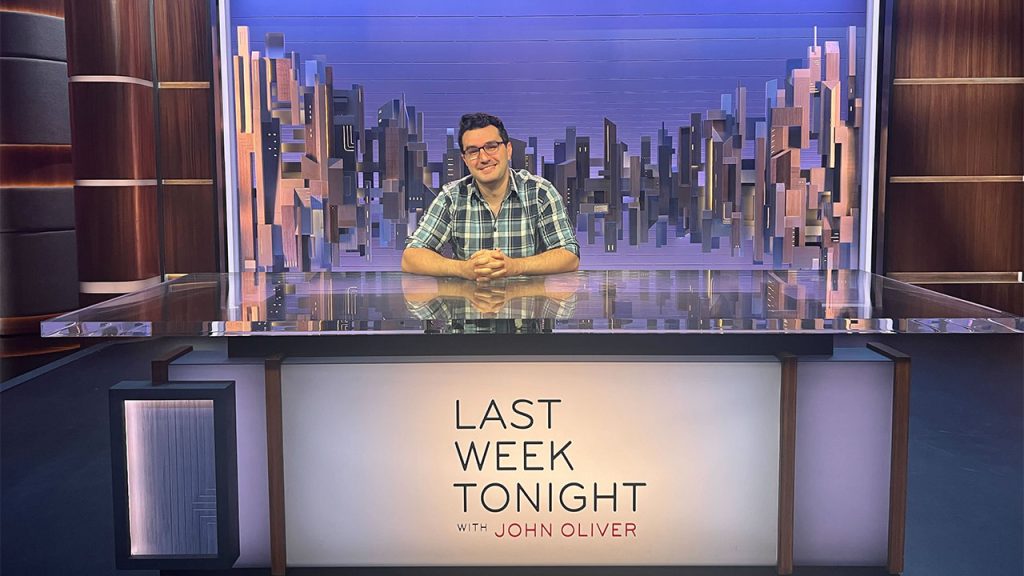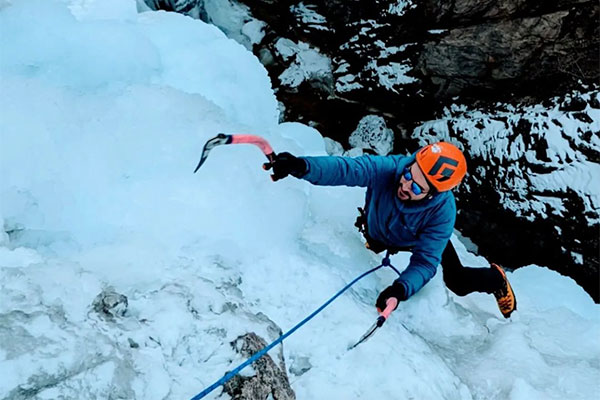Seena Vali majored in math and minored in music at Fordham—not the typical background for an Emmy Award-winning comedy writer. But he also wrote for the paper, the irreverent alternative campus newspaper, and went on to intern at ABC News and The Onion, where he became a staff writer in 2013. Now, he’s a senior writer for HBO’s weekly satirical news show Last Week Tonight with John Oliver, where he began in 2017.
On Sunday evening, the show won the Emmy Award for Outstanding Scripted Variety Series—its ninth win in a row—and as senior writer on the show, Vali took home his eighth Emmy for Outstanding Writing for a Variety Series, a dynastic run of critical success that he calls “humbling.” The show, which each week takes an irreverent deep dive into a broad range of issues like net neutrality, televangelism, and predatory lending, also earned Vali a prestigious Peabody Award in 2018. Fordham Magazine spoke with the 2010 Fordham College at Rose Hill grad about the role comedy plays in tackling big issues, why Oliver is so good at what he does, and, naturally, the thrills of ice climbing.
What are some of the big differences you encountered going from a print/digital publication to working on a weekly TV show?
I think the biggest thing is that here, there’s such a heavy research element to the show. Obviously we did research at The Onion, and we wanted things to be accurate in the world of the stories, but we weren’t really consulting experts from Harvard about anything.
To give you a rundown of how we make a story, a topic is pitched and the research team will compile a document that can be 100 pages, like “I’ve talked to people at Boeing, I’ve talked to people who are experts in aviation at various universities.” And meanwhile, the footage department will compile documentaries and news reports, all sorts of footage, as well as funny clips that we could potentially use. Most stories here are a four- or five- or six-week process.
Another element I’m really interested in is that you’re writing for a specific person—a specific voice—in John Oliver. How did you get used to writing things for his particular delivery?
It was its own bit of a learning curve. But then once you know where the boundaries are and what works and what doesn’t, you can just have fun.
To John’s credit, I think he does a great job of adopting elements of our comedic voices as writers. So there are definitely jokes where he’s obviously speaking as himself, but I am injecting my comedic sensibility in there as well, and he is manifesting that. It’s a cool two-way street where we’re writing for his voice, but he is also giving us the freedom to write in our own voices and he will find his own way to perform it.
How would you describe what makes something funny coming from him?
He has a humongous comedic range, which is why I think he’s able to manifest different writers’ voices. I always write long runs with him being obsessive over weird things, where he’ll zero in on some weird esoteric thing that is only tangentially related to the topic of the show and talk about it for six minutes—where he’ll be really into weightlifting or really into horses or really into aquatic life. Those are always really fun for me. I feel like it gives us the opportunity as writers to obsess over those topics.
While it’s not necessarily focused on electoral politics, Last Week Tonight is certainly a political comedy show in some ways. What do you see as the societal role of that style of comedy?
I think everyone falls on a different spot on that map of making people laugh versus taking a more activist approach towards what you’re writing. The kind of comedy and satire that I find to be the most effective is when you’re talking about something that’s a really difficult issue, but you’re finding a moment of catharsis that everyone can collectively feel.
I don’t know if we’re going to change anyone’s mind on anything. I’m guessing that most of the people who watch this show are probably more politically aligned with us than not. But I do think if you can make them think about something in a way that they hadn’t before, that’s a success. And if you can do that while making them laugh and entertaining them—that’s what I strive to do.
One thing that I think is smart about the show is that there are often built-in calls to action—and some of those are really funny calls to action that speak to the absurdity of a situation.
Totally. And I think we like highlighting things that are maybe on the more boring side or technical side of politics—something as technical as gerrymandering or zoning. It’s cool to put a magnifying glass on things that can go under the radar but that are actually really important.
Between seasons, I’m sure there’s a lot of work being done, but presumably you have at least a little bit of a break there. How do you spend that time?
Yeah, we usually get about seven or eight weeks between seasons. It’s really nice to have a break to decompress and work on my own personal writing. And I also really like ice climbing, so I go to western Colorado and ice climb for a few weeks, which is always fun.
Oh wow, ice climbing?!
Yeah, I started getting into it around 2019. I tried it for the first time and I started getting super into it. There’s a place in southwestern Colorado called Ouray that actually has an ice climbing park. It’s a gorge that they water and they actually make ice on it. I’ve been going there for a few weeks every year for the last few years. Just getting to play in this ice wonderland for a few weeks is a nice way to decompress after the season, and then I feel like I’m rebalanced and ready to go for the new one.
Interview conducted, edited, and condensed by Adam Kaufman, FCLC ’08.


